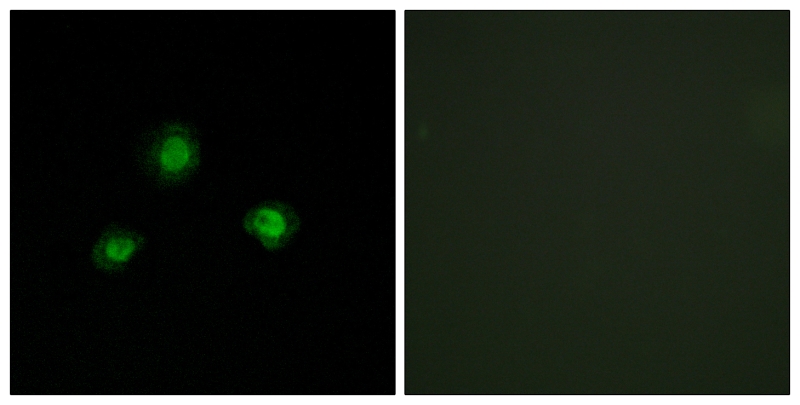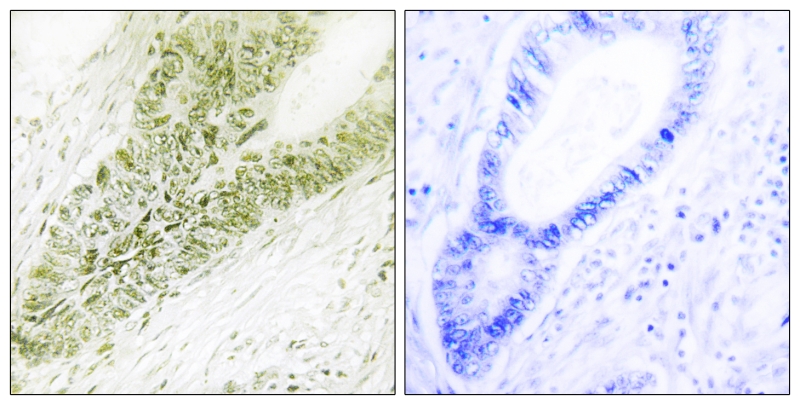

| WB | 咨询技术 | Human,Mouse,Rat |
| IF | 咨询技术 | Human,Mouse,Rat |
| IHC | 1/50-1/100 | Human,Mouse,Rat |
| ICC | 1/50-1/200 | Human,Mouse,Rat |
| FCM | 咨询技术 | Human,Mouse,Rat |
| Elisa | 1/10000 | Human,Mouse,Rat |
| Aliases | VT; VT4 |
| Entrez GeneID | 29855 |
| Host/Isotype | Rabbit IgG |
| Antibody Type | Primary antibody |
| Storage | Store at 4°C short term. Aliquot and store at -20°C long term. Avoid freeze/thaw cycles. |
| Species Reactivity | Human,Mouse |
| Immunogen | The antiserum was produced against synthesized peptide derived from human Ubinuclein. AA range:161-210 |
| Formulation | Purified antibody in PBS with 0.05% sodium azide,0.5%BSA and 50% glycerol. |
+ +
以下是关于Ubinuclein 1(UBN1)抗体的3篇代表性文献摘要,涵盖其在染色质调控、疾病模型及相互作用研究中的应用:
---
1. **"Human UBN1 is an ortholog of yeast Hpc2p and regulates H3.3 chromatin deposition"**
*Authors: Banumathy G., et al. (2009)*
**摘要**:本研究通过免疫共沉淀和Western blot技术,利用UBN1抗体揭示了其作为HIRA复合体的核心组分,参与组蛋白变体H3.3的染色质沉积,并证实其与染色质组装及基因沉默的相关性。
2. **"Ubinuclein-1 confers histone H3.3-specific-binding by the HIRA histone chaperone complex"**
*Authors: Rai T.S., et al. (2011)*
**摘要**:通过免疫荧光和蛋白质互作实验(使用UBN1抗体),发现UBN1通过C端结构域特异性识别H3.3.调控HIRA复合体在DNA复制偶联的染色质组装中的作用,为发育异常相关疾病提供机制解释。
3. **"Ubinuclein-1 expression is a prognostic factor in oral squamous cell carcinoma"**
*Authors: Wang L., et al. (2016)*
**摘要**:采用UBN1抗体进行免疫组化分析,发现UBN1在口腔鳞癌组织中高表达,且与患者不良预后显著相关,提示其作为潜在肿瘤标志物的价值。
---
以上文献展示了UBN1抗体在基础机制(染色质调控)和临床研究(癌症标志物)中的关键应用。如需更近期研究,建议在PubMed等平台以“UBN1 antibody”为关键词筛选近年文章。
Ubinuclein 1 (UBN1) is a nuclear protein involved in chromatin remodeling and transcriptional regulation. It interacts with histone chaperones like HRNR (histidine-rich nuclear protein) to form complexes that influence histone deposition and nucleosome organization, particularly during cellular differentiation. UBN1 is highly expressed in tissues such as skin, hair follicles, and certain epithelial cells, where it plays a role in maintaining chromatin structure and regulating gene expression. Its functional domains, including nuclear localization signals and coiled-coil regions, facilitate protein-protein interactions critical for its activity.
Antibodies targeting UBN1 are essential tools for studying its expression, localization, and molecular interactions. These antibodies (polyclonal or monoclonal, often raised in rabbits or mice) are validated for applications like Western blotting, immunohistochemistry (IHC), and immunofluorescence (IF). They help identify UBN1’s role in cellular processes such as tissue development, differentiation, and aging. Additionally, UBN1 has been implicated in pathological contexts, including cancer and skin disorders, where dysregulated expression may serve as a biomarker or therapeutic target. Researchers rely on UBN1 antibodies to explore its association with diseases and mechanistic pathways, contributing to advancements in molecular biology and clinical diagnostics. Specificity validation, including knockout controls and cross-reactivity assessments, ensures reliability in experimental models.
×